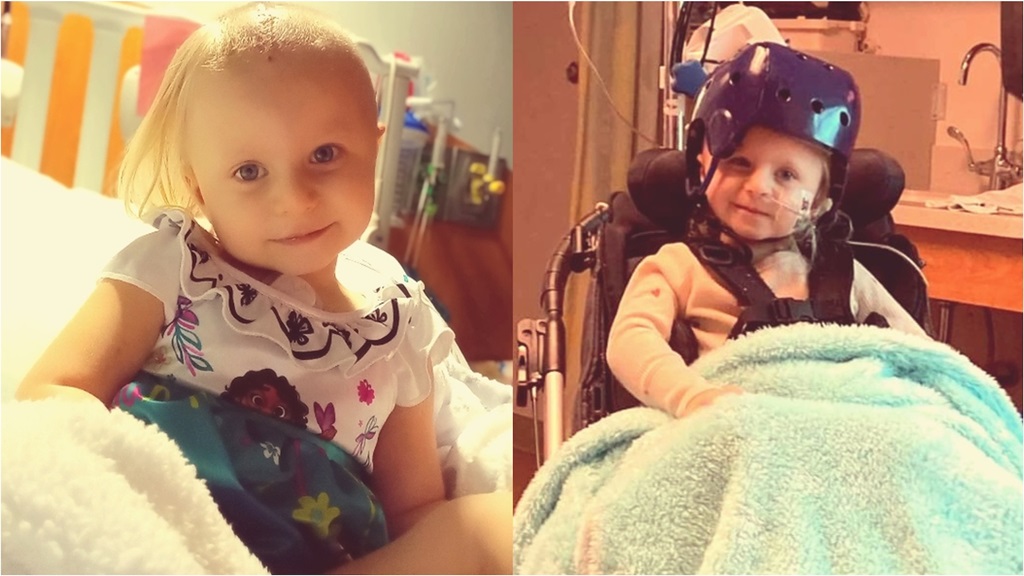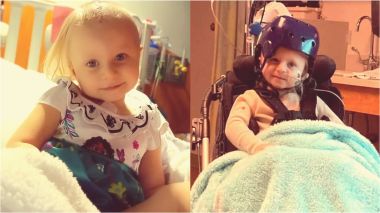November 2023 began like many others for families with toddlers: two-year-old Everleigh Pittman had what seemed to be an upper respiratory infection. But soon, her cough worsened, even after she tested negative for the flu, COVID-19 and strep throat.
Everleigh’s mom, Laura, describes the two-year-old as “vibrant and full of energy.” The toddler loves playing outside, spending time with her older brother, snuggling with her dog and cat, and putting together puzzles. So, when Everleigh wasn’t recovering from the suspected virus, Laura knew something wasn’t right.
She took Everleigh to a local hospital near their home in Western North Carolina’s McDowell County. Testing revealed that Everleigh’s heart rate was high — 257 — and the community hospital didn’t have the resources to care for a complex pediatric case.
Everleigh’s diagnosis and care at Levine Children’s
The medical team recommended Everleigh transfer to a place with a higher level of specialized pediatric care. Everleigh’s family decided to take her to Atrium Health Levine Children’s Hospital, where they’d have access to the specific care she needed. When Everleigh arrived at Levine Children’s Hospital, she was diagnosed with ventricular tachycardia. Ventricular tachycardia is a heart condition where the lower chambers of the heart beat too fast, preventing the heart from pumping normally. She was admitted to the cardiovascular intensive care unit (CVICU).
Because Everleigh’s blood pressure dropped so much as a result of the ventricular tachycardia, her medical team was also concerned about her liver and kidney function. Eventually, Everleigh needed a tube to help her keep breathing.
A scary constellation of symptoms
Everleigh’s medical team gave her medication to temporarily stabilize her heart rhythm, which allowed them to run tests to look for the cause of her heart issues. An MRI revealed the toddler had suffered a stroke on the right side of her brain, likely caused by the ventricular tachycardia. Everleigh also had a blood clot in one of her arteries and several blood clots in her arms.
Compounding the dire situation was Everleigh’s cerebral edema with midline shift, meaning she had swelling in her brain. She had brain surgery to relieve the pressure in her brain and was transferred to the pediatric intensive care unit (PICU) for close monitoring.
Everleigh eventually improved from a neurocritical care standpoint and was transferred back to the CVICU for the management of her heart arrhythmia.
Everleigh’s recovery
Everleigh spent time on the rehabilitation floor at Levine Children’s Hospital and made progress with her movement and speech, as the stroke affected her speech patterns and caused left hemiplegia. Based on the significance of the stroke, Everleigh will likely have some weakness in her left side for the rest of her life.
“She’s definitely trying to get back to her normal self — she’s a fighter,” says Laura.
Everleigh is now home from the hospital and her heart medication is working well to control her arrhythmia. She’s also healing well from her brain surgery.
Everleigh still needs a wheelchair or walker for mobility, but her mom is optimistic she’ll soon walk on her own as she makes progress in physical and occupational therapy. She’s still on a feeding tube but is gaining weight and growing well.
“We saw the pediatric neurologist a few weeks ago and she was impressed with how well Everleigh is doing,” says Laura. “And her gastroenterologist is impressed with her weight.”
Once Everleigh has completed rehabilitation and reaches a certain body weight, she’ll likely need an ablation procedure to treat her arrhythmia. She’ll also need to take heart medication for a year and continue with physical and occupational therapy at home.
“It’s not going to be long before she’s hopefully walking without the help of a walker or needing a wheelchair,” says Laura. “We take it one day at a time.”
Everleigh’s case exemplifies Levine Children’s expertise in treating pediatric patients with complex medical needs. She was cared for by cardiology, neurosurgery, hematology, critical care, genetics, rheumatology, infectious disease, dermatology and rehabilitation specialists.
“I can’t thank Everleigh’s doctors, nurses and therapists enough for all they’ve done for her between the ICU and progressive floor,” says Laura. “I can’t thank Levine Children’s enough for everything they’ve done to support her.”
She encourages other families of children with serious medical issues to “not give up and take it one day at a time. God’s by your side.”
Learn more about the specialized collaborative care at Atrium Health Levine Children’s.



